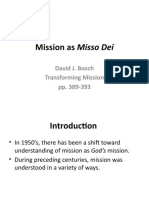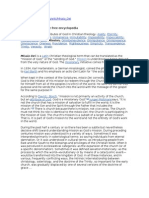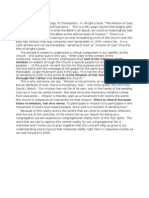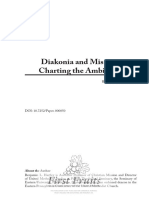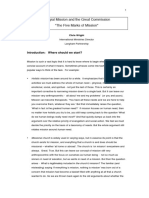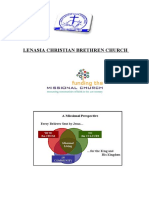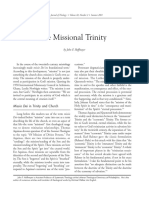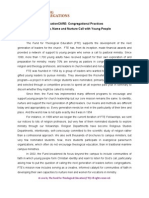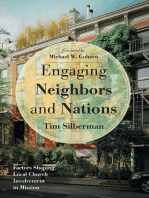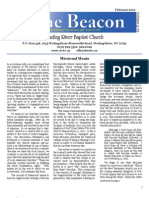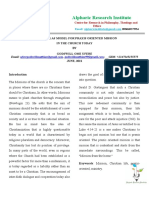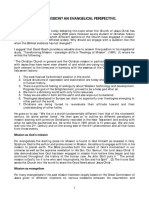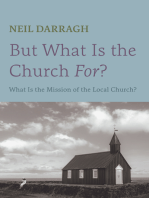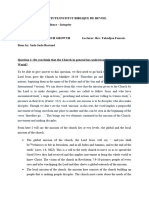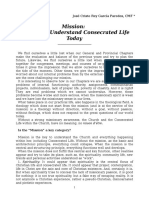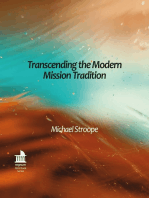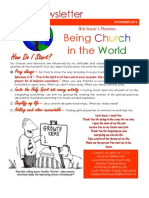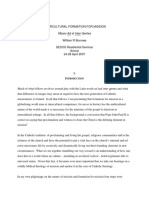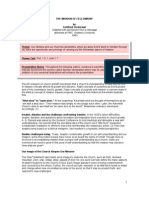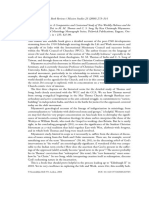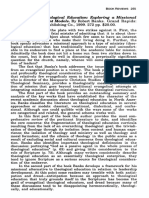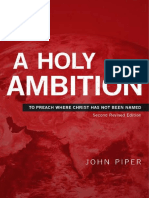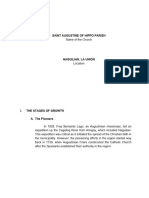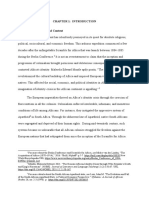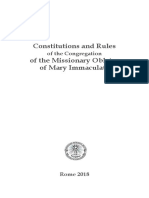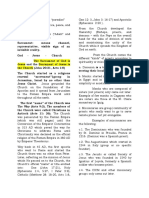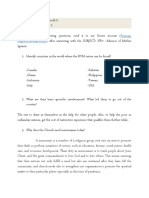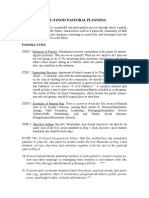0 ratings0% found this document useful (0 votes)
22 viewsSupplement: The Five Marks of Mission
Supplement: The Five Marks of Mission
Uploaded by
ynsanchezThe document discusses the meaning of the term "mission" and explores different perspectives on its definition. It examines the origins and usage of the word in both secular and religious contexts. The key debates around whether mission primarily refers to proclamation or social action are summarized. The document ultimately argues that mission stems from God's initiative, not humanity's, and that understanding God's missional heart is more important than theological debates over specific activities.
Copyright:
© All Rights Reserved
Available Formats
Download as PDF, TXT or read online from Scribd
Supplement: The Five Marks of Mission
Supplement: The Five Marks of Mission
Uploaded by
ynsanchez0 ratings0% found this document useful (0 votes)
22 views5 pagesThe document discusses the meaning of the term "mission" and explores different perspectives on its definition. It examines the origins and usage of the word in both secular and religious contexts. The key debates around whether mission primarily refers to proclamation or social action are summarized. The document ultimately argues that mission stems from God's initiative, not humanity's, and that understanding God's missional heart is more important than theological debates over specific activities.
Original Description:
Marcas de la Misión
Original Title
Cincomarcasdelamisión
Copyright
© © All Rights Reserved
Available Formats
PDF, TXT or read online from Scribd
Share this document
Did you find this document useful?
Is this content inappropriate?
The document discusses the meaning of the term "mission" and explores different perspectives on its definition. It examines the origins and usage of the word in both secular and religious contexts. The key debates around whether mission primarily refers to proclamation or social action are summarized. The document ultimately argues that mission stems from God's initiative, not humanity's, and that understanding God's missional heart is more important than theological debates over specific activities.
Copyright:
© All Rights Reserved
Available Formats
Download as PDF, TXT or read online from Scribd
Download as pdf or txt
0 ratings0% found this document useful (0 votes)
22 views5 pagesSupplement: The Five Marks of Mission
Supplement: The Five Marks of Mission
Uploaded by
ynsanchezThe document discusses the meaning of the term "mission" and explores different perspectives on its definition. It examines the origins and usage of the word in both secular and religious contexts. The key debates around whether mission primarily refers to proclamation or social action are summarized. The document ultimately argues that mission stems from God's initiative, not humanity's, and that understanding God's missional heart is more important than theological debates over specific activities.
Copyright:
© All Rights Reserved
Available Formats
Download as PDF, TXT or read online from Scribd
Download as pdf or txt
You are on page 1of 5
Supplement
The Five Marks of Mission
Martin Lee
ment which we translate as ‘sent’, though others use them as
KEYWORDS: Mission statement, apostle, purpose, gospel,
their root. Apostello is most often translated as ‘sent forth’
preaching, social action, holistic mission, integral mission,
and is the word from which we get Apostle or ‘one sent
missio Dei, kingdom of God, Abraham, Moses, Israel, mis-
sional community, teaching, transformation, creation, forth’. Again purpose seems to be attached – the word ‘forth’
proclamation, missionaries, discipleship giving it an edge. The other word, Pempo, is more commonly
translated as ‘sent’ and seems to have less of a purpose
attached. However, there is always a reason in sending some-
What does the word mission conjure up for you? It’s a word one and it certainly isn’t purposeless. So I think we can
that now seems to have become part of common parlance in safely conclude that mission is about ‘sending with a pur-
the business world. Where would any company be without pose’.
its mission statement these days? Be it ‘a computer on every Throughout history there has been much debate about the
desk’ or ‘committed to providing your logistic solutions’, mission of the church. The modern missionary movement,
business mission statements focus on aims and delivery, set- especially since the end of the eighteenth century, seemed to
bring with it a limited meaning to mission, such as:
ting down in a few words the whole purpose of the business
– other than of course making lots of money for its owners. • It was conceived mainly in geographical terms, with
‘Committed to maximising shareholder returns’ wouldn’t go the purpose of taking the gospel from the Christian
down so well!! West to the mission fields of the non-Christian world.
Mission has been a word used by English-speaking Sending was perceived as being trans-cultural in
churches for generations. Yet there seems to be intense nature.
debate about its meaning, despite the fact that the word itself • The purpose was to save souls and to plant churches,
does not appear in any English translation of the scriptures? mainly in foreign countries, by means of the preaching
So what do we mean by it? of the gospel.
The word comes from the Latin missum (English: sent). • The agents of mission were principally missionaries
Yet it is wider than just the sending itself and seems to have (who had a sense of an individual subjective call to the
an implication of being sent with a specific task. It isn’t pur- mission field) and the agencies that sent them.
poseless, a going or sending for no reason. The old TV series Much of that legacy still exists today in the way churches
and recent film, ‘Mission Impossible’, sets a clear task for in the UK support mission.
the team to go and do, and of course the team succeeds, The home/overseas divide, the debate on the purpose of
though I suppose ‘Mission not quite impossible’ isn’t such a mission, the support of missionaries, the lack of engagement
catchy title. So maybe the focus on aims and delivery in busi- by local churches – the list is endless.
ness mission statements isn’t that far off the mark in In our own context here in the UK (and generally in the
understanding the meaning behind mission. West), in the latter part of the 20th Century there was a rise
There are two main Greek words used in the New Testa- of groups, even evangelical in origin, that wanted to focus
GLOBAL CONNECTIONS OCCASIONAL PAPER No.29, AUTUMN 2008 i
on social action, in addition to or even instead of preaching of God is a fountain of sending love.’4 Thus, the role of the
the gospel. This led to further discussion and disagreement church is to participate in the mission of God and the
about what mission is all about. What part does social action church’s mission is only a subset of a larger whole mission.
play? Is it an essential part of mission? There was a fear that It is part of God’s mission to the world and not the entirety
a social gospel might be preached. As a result, parts of the of God’s work in the world.
church have confined mission to proclamation alone or at ‘Mission goes out from God. Mission is God’s way of lov-
least declaring it paramount, with all other activities of no ing and saving the world . . . So mission is never our invention
value unless proclamation is happening. Unless the word is or choice.’5 The initiative in mission is God’s, not ours. We
preached, mission is not taking place. are called simply to be part of God’s mission as we follow
Other parts of the church have gone the other way and it Jesus who said, ‘As the Father has sent me, so I send you’
is almost as if anything goes. Anything which is serving or (John 20:21). It’s not the church of God that has a mission,
reaching out into the community is mission. Proclamation but the God of mission who has a church.
does not have to be present; if fact it can be a hindrance. Sol- Maybe in the light of this we need to rethink our termi-
idarity with the poor, engagement in liberation, campaigning nology. To quote one mission leader recently: ‘I get very
for justice – these are the true marks of mission. twitchy at the number of agencies talking about “come and
Yet other parts of the church have sought to bring these join us in our mission” and getting very proprietary about
different viewpoints together under the umbrella of ‘holis- mission. It is actually God’s mission. We need to address
tic’ mission. It seeks to see proclamation and social action as this issue when we talk about selection and how is your
two parts of the same piece of string, bound together to form recruitment going? Are we recruiting people to our agency or
a strong bond, not two competing ideologies. to the work of the kingdom?’
In recent times the term ‘integral mission’1 (from ‘misión Understanding missio Dei requires a change of mindset,
integral’) coined by the Latin American Theological Frater- new terminology and a new way of working.
nity (FTL) about twenty years ago has come into use. To
quote René Padilla, Tearfund’s former international presi-
dent, ‘The church’s purpose is to witness to the love and The purpose of mission
justice revealed in Jesus Christ, by the power of the Spirit, for Another of the common strands of recent years is that ‘the
the transformation of human life.’ Scriptures teach that the end result of such missio Dei is the
So does a theology of ‘integral mission’ solve the issue? glorification of the Father, Son, and Holy Spirit’.6 Perhaps
Does the aim of recognizing both our commission to preach one way of reviewing that statement is to look briefly at a
the gospel and to love our neighbour end all debate? Does few people who were sent by God, the purpose behind that
that mean we always have to have proclamation and social sending and how it fitted into the bigger picture.
action together in every missional activity? Is that what is One of the first people sent by God was Abraham. Genesis
meant by integral mission? It certainly doesn’t seem to solve 12:1-3 refers to that calling in which:
the debate for some, yet for others the proclamation versus
• He was called to leave his comfort zone
social action divide is old hat. In their own minds it has been
resolved long ago one way or the other. • He was chosen for a specific mission
Yet to me there are much bigger issues that the church • The initial focus was on his own family
needs to grapple with than the social action versus procla- • The ultimate mission was that ‘all peoples on earth will
mation argument, especially understanding the missional be blessed through him’ (Gen. 12:3)
heart of God himself. Has our theology and missiology simply Another key character sent by God, of course, is Moses
responded to the surrounding context, rather than sought to and his experience is described in Exodus 3:1-10. There are
rediscover the richness of mission in the scriptures? many similarities to the sending of Abraham:
• He too was called to leave his comfort zone
Whose mission is it? • He too was chosen for a mission
‘Please help us in our mission’ is the cry of many mission • The focus was initially on liberating the nation of
agencies and committed missionaries. Evangelicals have Israel. It was on promoting justice and freeing them
always been and will always be activists. Yet the emphasis from oppression, not just a spiritual task
on our mission, our calling, our sending, our ministry, always • There was an ultimate purpose as well
fills me with concern. Why had God sought out this nation for special treatment?
In response to Karl Barth and his emphasis on actio Dei It was because it too had a mission – to be a witness to the
(Latin for ‘the action of God’), in 1934, Karl Hartenstein nations (Deuteronomy 4:5-8). They were not special in them-
(1894-1952)2 coined the phrase, missio Dei (mission of God). selves (Deuteronomy 7:7-8) but they were called to be
His thesis was that mission is not primarily an activity of ‘priests’ to the nations (Exodus 19:3-6). Israel was special
the church, but an attribute of God. God is a missionary God. because it had a special part in the mission Dei, a missional
‘It is not the church that has a mission of salvation to fulfill task to help all nations give glory to God. Throughout the
in the world; it is the mission of the Son and the Spirit Old Testament, this missional task of Israel is emphasised.
through the Father that includes the church.’3 Even a quick look at Psalm 47, Psalm 96, 1 Kings 8 and Isa-
As David Bosch said: ‘There is church because there is iah 66 shows the desire of God for his glory to be declared
mission, not vice versa. To participate in mission is to par- among all nations, his marvellous deeds among all people.
ticipate in the movement of God’s love toward people, since Sadly all too often Israel failed in its task of joining in
ii GLOBAL CONNECTIONS OCCASIONAL PAPER No.29, AUTUMN 2008
God’s mission. It forgot its specialness was for ALL Integral Mission revisited
NATIONS and thought it was the centre of God’s mission
itself, not its agent. At the same time it restricted its mis- We saw earlier how the concept of integral mission has been
used in UK context to try to bring together social action and
sion of seeing God being glorified to narrow definitions of
proclamation. Yet the theology behind integral mission is
the law.
much more than just a coming together of social action and
What lessons are there for the church today? Are we
proclamation. It seeks, from a Latin American perspective, to
falling into the same trap? Like Abraham, Moses and the
bring together many divides perpetuated by the ‘missionary
nation of Israel, we too have been called to a missional task.
movement’ of the past. It covers issues such as:
The church exists to be a missional community, not keeping
good things to ourselves. Yet the church usually concentrates • The dichotomy between churches that send out mis-
on just being a pastoral community, looking after our own. sionaries and those that receive missionaries
Peter kept the early church on track. Acts 10:34: Then Peter • The dichotomy between trans-cultural mission and
began to speak: ‘I now realise how true it is that God does local mission
not show favouritism but accepts men from every nation who • The dichotomy between full-time workers (the clergy,
fear him and do what is right.’ missionaries, pastors, evangelists) and ordinary Chris-
Are we joining in the missio Dei, or keeping good things to tians, who can enjoy the benefits of salvation but feel
ourselves? Is our desire to see left out of sharing in what God wants to do in the world
God’s glory declared among all nations, his marvellous • The dichotomy between the life and the mission of the
deeds among all people. church
• The dichotomy between proclamation and other aspects
of mission
The five marks of mission To quote René Padilla again: ‘Commitment to mission is
So if mission is really God’s mission and God’s desire is to the very essence of being the church. A church that is not
see his glory declared to all nations and for all nations to be committed to witnessing to Jesus Christ and thus to crossing
blessed, where does that leave the church? In 1984 the the frontier between faith and no faith is no longer the
Anglican Communion postulated five marks of mission7 that church, but becomes a religious club, simply a group of
stem from the missio Dei and the understanding that God’s friends, or a social welfare agency. When the church is com-
mitted to integral mission and to communicating the gospel
glory is to be declared to all nations. They are:
through everything it is, does, and says, it understands that
• To proclaim the Good News of the Kingdom its goal is not to become large numerically, nor to be rich
• To teach, baptise and nurture new believers materially, nor powerful politically. Its purpose is to incar-
• To respond to human need by loving service nate the values of the Kingdom of God and to witness to the
• To seek to transform unjust structures of society love and the justice revealed in Jesus Christ, by the power
• To strive to safeguard the integrity of creation and sus- of the Spirit, for the transformation of human life in all its
tain and renew the life of the earth dimensions, both on the individual level and on the commu-
nity level.’9
Since then there has been much debate on the meaning
of each of these marks and how they can be contextualised in
mission today. No longer is it a simple ‘proclamation’ ver- A new mission statement
sus ‘social action’ debate, but a much wider one on the whole
Perhaps the business world helps here too. The concept of a
identity, purpose and marks of mission. mission statement can be helpful for us as we seek to be part
Do all these elements have to be present in all mission of the missio Dei. Jesus himself seemed to be sure of his mis-
activity? If one sees the mission of the church and our own sion and able to articulate it. Luke 4:18-19 has always been
roles in it as just part of the mission of God, there has to be to me the greatest mission statement ever written:
an emphatic ‘No’! Yes, all are key marks of the mission of
The Spirit of the Lord is on me, because he has
God, and we need to see them all as parts of the same great
anointed me to preach good news to the poor. He has
picture. But it is in the wholeness of the God’s mission that
sent me to proclaim freedom for the prisoners and
they are complete and complementary, not in the separate-
recovery of sight for the blind, to release the oppressed
ness of each activity.
and to proclaim the year of the Lord’s favour.
The five marks have recently been explored in more depth
in the book, Mission in the 21st Century, edited by Andrew As I seek to be part of God’s mission, I tend to use the
Walls and Cathy Ross.8 The book draws from a diverse selec- following, based on the five marks of mission but which give
tion of theologians and missiologists, mainly non-western. slightly different emphases as I seek to form my own mis-
The editors make clear it that the five marks are neither a sion statement to help me clarify what God is calling me to
perfect or complete definition of mission. They do not say with the overall missio Dei:
everything that we might want to say about mission in • Proclamation and sharing the Good News
today’s world. However, they are rich with potential and per- • Discipleship and helping people obey all that the Lord
haps offer a wider understanding to a holistic approach to commanded
mission than the narrow debates around the role of social • Social Action through loving neighbour, caring for the
action. poor, healing the sick
GLOBAL CONNECTIONS OCCASIONAL PAPER No.29, AUTUMN 2008 iii
• Campaigning on matters of social justice and right- 2 Gerald H. Anderson, Biographical Dictionary of Christian Mis-
eousness sions (Wm. B. Eerdmans Publishing, 1999), p. 282.
• Caring for creation, so creation too can glorify God 3 Jurgen Moltmann, The Church in the Power of the Spirit: A Con-
Understanding our place in the mission of God can be lib- tribution to Messianic Ecclesiology (London: SCM Press, 1977),
erating and releasing. Maybe what we do is as different from p. 64.
others as God’s specific calling to us can be varied. Maybe 4 David J. Bosch, Transforming Mission (Maryknoll: Orbis
even the marks of mission in which we predominately oper- Books, 1991), pp. 389-390.
ate are different. Yet together we are just part of the missio 5 Lambeth Conference 1998, Section II p121.
Dei so that God (Father, Son, and Holy Spirit) may be glori- 6 George W. Peters, A Biblical Theology of Missions (Chicago:
fied. Moody Press, 1972), p. 9.
Martin Lee 7 Bonds of Affection 1984 ACC-6 p. 49; Mission in a Broken
Director, Global Connections World 1990 ACC-8 p. 101.
8 A Walls and C Ross, Mission in the 21st Century (Darton Long-
man & Todd, 2008).
Notes 9 See http://www.integral-mission.org/PDF_files/Rene-
1 See http://www.integral-mission.org/ What_is_integral_mission.pdf
Becoming More Like Christ Celebrating Life
Introducing a Biblical-Contemporary Journey Beyond the Sacred-Secular Divide
Peter R. Holmes Graham Buxton
None of us are born Christ-like, none of us become Christ-like As Christians, our engagement with the world and with
at conversion, and none of us become more Christ-like by just culture is often impoverished as a result of unbiblical
being in church, or even reading the Bible. We all need to dualisms. More than we realise, the divide between sacred and
personally change to become more like Jesus – to become secular is reinforced in our minds, contributing to an
more human. unhealthy and, at times, narrow superspirituality. Seeking a
more postmodern, holistic and, ultimately, more Christian
In contemporary society change is identified as essential to approach to culture, Graham Buxton leads us on a journey
the journey toward personal maturity. This book suggests that towards the celebration of life in all its dimensions.
from a biblical perspective personal positive change is central
to a journey of discipleship-wholeness, toward a greater The first part of the book examines the roots of our dualistic
personal Christ-like maturity. The book calls for a rethink of thinking and its implications for culture. Part Two draws us
current church practice, where people are normally expected from dualism to holism in a number of chapters that consider
to change at conversion, becoming more like other members, our engagement with literature, the creative arts, science,
but subsequently are not required to change much at all. The politics and business. Part Three draws the threads together
book outlines and introduces the reader to a step by step by setting out the dimensions of a more holistic theology of
approach to personal positive change and wholeness, for the church’s engagement with, and participation in,
anyone wishing to begin a journey toward greater Christ- contemporary society that will lead us ‘beyond the sacred-
likeness. secular divide’.
Peter R. Holmes (PhD) is co-founder of Christ Church Deal in Graham Buxton is Director of Postgraduate Studies in
Kent and of Rapha. He is a member of the Association of Ministry and Theology, Tabor College, Adelaide, Australia. He
Therapeutic Communities and a management trainer. His is author of Dancing in the Dark and The Trinity, Creation and
previous books include Becoming More Human and Trinity in Pastoral Ministry.
Human Community.
978-1-84227-507-8 / 216 x 140 mm / 192pp (est.) / £9.99
978-1-84227-543-6 / 216 x 140mm / 152pp (est.) / £9.99
Paternoster, 9 Holdom Avenue, Bletchley, Milton Keynes MK1 1QR, UK
iv GLOBAL CONNECTIONS OCCASIONAL PAPER No.29, AUTUMN 2008
You might also like
- Encountering Theology of Mission (Encountering Mission): Biblical Foundations, Historical Developments, and Contemporary IssuesFrom EverandEncountering Theology of Mission (Encountering Mission): Biblical Foundations, Historical Developments, and Contemporary IssuesRating: 4.5 out of 5 stars4.5/5 (5)
- Christain MinistryDocument4 pagesChristain Ministrykiran dara100% (2)
- What Is Integral Mission CR PadillaDocument7 pagesWhat Is Integral Mission CR PadillaGuillermo Huezo100% (1)
- Mission As Misso DeiDocument22 pagesMission As Misso Deiwin khant100% (1)
- Musa Project Proposal On Christian MissionsDocument53 pagesMusa Project Proposal On Christian MissionsMusa Ishaya67% (3)
- Apostles The Fathering ServantDocument20 pagesApostles The Fathering ServantJose Humberto Zumarraga Novelo100% (3)
- SSPX SA HistoryDocument324 pagesSSPX SA HistoryLukeNo ratings yet
- Biblical Theology of Missions ReviewDocument6 pagesBiblical Theology of Missions ReviewIbnu Gunawan100% (1)
- Pcea Strategic PlanDocument56 pagesPcea Strategic PlanMbugua Maguta100% (2)
- Supplement: The Five Marks of MissionDocument5 pagesSupplement: The Five Marks of MissionynsanchezNo ratings yet
- Mission As Missio DeiDocument7 pagesMission As Missio DeiJone SaraqiaNo ratings yet
- Mission of The Church at 21st CenturyDocument6 pagesMission of The Church at 21st CenturyRev. Jacob Antony koodathinkalNo ratings yet
- Missio Dei - Definición WikipediaDocument5 pagesMissio Dei - Definición WikipediaArameo1No ratings yet
- What Is The Missional Church4Document14 pagesWhat Is The Missional Church4Abiud UrbinaNo ratings yet
- Missional LivingDocument1 pageMissional LivingDan BoyceNo ratings yet
- Mission in The Context of Religious PluralismDocument34 pagesMission in The Context of Religious Pluralismsir_vic2013100% (2)
- Missio Dei Group 2 PresentasiDocument25 pagesMissio Dei Group 2 PresentasiPrayitnoNo ratings yet
- Diakonia and Mission - Charting The AmbiguityDocument19 pagesDiakonia and Mission - Charting The AmbiguityhirunikosiregarNo ratings yet
- To An Understanding of Mission As One That Affirms The Following (Theo-Centric View)Document23 pagesTo An Understanding of Mission As One That Affirms The Following (Theo-Centric View)Mallet S. GacadNo ratings yet
- Chris Wright IntegralMissionandtheGreatCommissionDocument20 pagesChris Wright IntegralMissionandtheGreatCommissionLeon MoraisNo ratings yet
- A Biblical Understanding of MissionsDocument9 pagesA Biblical Understanding of MissionsKoami dogbeda hoeganNo ratings yet
- Gods Big IdeaDocument11 pagesGods Big IdeaTamayo Jeremiah M.No ratings yet
- From Mission To Evangelism To Mission: by Ralph D. WinterDocument3 pagesFrom Mission To Evangelism To Mission: by Ralph D. WinterJacob JuliannNo ratings yet
- Lenasia Christian Brethren ChurchDocument13 pagesLenasia Christian Brethren Churchrot100% (1)
- The Missional Trinity: by John F. HoffmeyerDocument4 pagesThe Missional Trinity: by John F. HoffmeyerynsanchezNo ratings yet
- FTE Vocation CARE PracticesDocument11 pagesFTE Vocation CARE PracticesfteleadersNo ratings yet
- Engaging Neighbors and Nations: Factors Shaping Local Church Involvement in MissionFrom EverandEngaging Neighbors and Nations: Factors Shaping Local Church Involvement in MissionNo ratings yet
- February 10 BeaconDocument8 pagesFebruary 10 BeaconcglassNo ratings yet
- Releasing The Ministry Of All God's People: A holistic Spirit-led modelFrom EverandReleasing The Ministry Of All God's People: A holistic Spirit-led modelNo ratings yet
- Luke 4 As Model For Praxis Oriented MissionDocument12 pagesLuke 4 As Model For Praxis Oriented MissionGodswill M. O. UfereNo ratings yet
- What Is Mission Stanley Davies 2005Document6 pagesWhat Is Mission Stanley Davies 2005AkhoiNo ratings yet
- Biblical Understanding of God's Mission in The WorldDocument74 pagesBiblical Understanding of God's Mission in The WorldJeevaraj AnthonyNo ratings yet
- Orca Share Media1567234349685Document12 pagesOrca Share Media1567234349685Civil Code100% (1)
- Understanding Mission Expressed in BEC and Teaching ApostolateDocument6 pagesUnderstanding Mission Expressed in BEC and Teaching ApostolateUlyung Diamante100% (1)
- But What Is the Church For?: What Is the Mission of the Local Church?From EverandBut What Is the Church For?: What Is the Mission of the Local Church?No ratings yet
- Church GrwothDocument2 pagesChurch GrwothDavid ForexNo ratings yet
- 12 ABM 2 SGBM - MODULE NO. 04 VINCENTIAN SPIRITUALITY - FLORESCA, AlzenDocument3 pages12 ABM 2 SGBM - MODULE NO. 04 VINCENTIAN SPIRITUALITY - FLORESCA, AlzenAlzen FlorescaNo ratings yet
- José Paredes Eng May 2007Document14 pagesJosé Paredes Eng May 2007Chell MariaNo ratings yet
- Role and Identity of Church in Biblical Story PDFDocument26 pagesRole and Identity of Church in Biblical Story PDFRh2223dbNo ratings yet
- RBT MambaDocument5 pagesRBT MambaRas Bahadur Tamang (Mamba)No ratings yet
- 7 Marks of Great PreachingDocument3 pages7 Marks of Great PreachingKaTUPA Pastor Rhoderick De VeraNo ratings yet
- 1 Revitalizing Evangelism 1 BgwrnuDocument20 pages1 Revitalizing Evangelism 1 BgwrnuGabriela DeguerNo ratings yet
- Theology of MissionDocument4 pagesTheology of MissionllcachurchkarankaduNo ratings yet
- Will You Join the Cause of Global Missions?From EverandWill You Join the Cause of Global Missions?Rating: 4.5 out of 5 stars4.5/5 (2)
- 'CFE 3 Introduction On Understanding MissionDocument13 pages'CFE 3 Introduction On Understanding MissionCamille G.100% (1)
- The Biblical Basis of Missions Course-Introduction and Chapter 1Document8 pagesThe Biblical Basis of Missions Course-Introduction and Chapter 1m28181920No ratings yet
- November 2012 NewsletterDocument8 pagesNovember 2012 NewsletterHaney Presbyterian ChurchNo ratings yet
- Modern Mission Concepts and Paradigms MiDocument11 pagesModern Mission Concepts and Paradigms MiRaajNo ratings yet
- Themes and Questions in Missiology Today: Century: The Book, The Circle and The Sandals (Maryknoll, NY: Orbis Books, 17Document15 pagesThemes and Questions in Missiology Today: Century: The Book, The Circle and The Sandals (Maryknoll, NY: Orbis Books, 17Alex Zammit100% (1)
- BurrowsDocument22 pagesBurrowsJuan Esteban MontoyaNo ratings yet
- On Being a Missionary (Abridged): An Introduction to Cross-Cultural Life and MinistryFrom EverandOn Being a Missionary (Abridged): An Introduction to Cross-Cultural Life and MinistryNo ratings yet
- Dialogue Ad-Intra As The Springboard of MissionDocument49 pagesDialogue Ad-Intra As The Springboard of Missionpaul rajNo ratings yet
- CFE 103 The Nature of MissionDocument13 pagesCFE 103 The Nature of MissionKaddy SummersNo ratings yet
- Godfried Oosterwal The Mission of FellowshipDocument7 pagesGodfried Oosterwal The Mission of FellowshippaulosmitNo ratings yet
- MISSIONDocument13 pagesMISSIONshinymathew1988No ratings yet
- What's So Special About Preaching?Document7 pagesWhat's So Special About Preaching?api-18331358No ratings yet
- Missional EcclesiologyDocument18 pagesMissional EcclesiologyDavide VarchettaNo ratings yet
- Gentium, The Dogmatic Constitution On The Church "Was Instrumental For The Emergence of ThisDocument40 pagesGentium, The Dogmatic Constitution On The Church "Was Instrumental For The Emergence of ThisMUNTING MISYON TVNo ratings yet
- © Koninklijke Brill NV, Leiden, 2008 DOI: 10.1163/157338308X365585Document3 pages© Koninklijke Brill NV, Leiden, 2008 DOI: 10.1163/157338308X365585ynsanchezNo ratings yet
- Developing Mission Curriculum in Theological Education To Impact The Local Churches For Missions in India TodayDocument14 pagesDeveloping Mission Curriculum in Theological Education To Impact The Local Churches For Missions in India TodayynsanchezNo ratings yet
- Missiology in A Pluralistic WorldDocument14 pagesMissiology in A Pluralistic Worldynsanchez100% (1)
- Mission Studies at Johannelund Theological Seminary: Klas LundströmDocument4 pagesMission Studies at Johannelund Theological Seminary: Klas LundströmynsanchezNo ratings yet
- Practical Theological Education-A ProfileDocument10 pagesPractical Theological Education-A ProfileynsanchezNo ratings yet
- Mission Studies at Orebro Theological Seminary: Göran J AnionDocument3 pagesMission Studies at Orebro Theological Seminary: Göran J AnionynsanchezNo ratings yet
- Reenvisioning Theological Education: Exploring A Missional Alternativetocurrentmodels - Byrobert Banks. Grand RapidsDocument3 pagesReenvisioning Theological Education: Exploring A Missional Alternativetocurrentmodels - Byrobert Banks. Grand RapidsynsanchezNo ratings yet
- British Journal of Theological Education 13.2 (2003)Document2 pagesBritish Journal of Theological Education 13.2 (2003)ynsanchezNo ratings yet
- The Relationship Between Church and Academy: EditorialDocument5 pagesThe Relationship Between Church and Academy: EditorialynsanchezNo ratings yet
- Playing in Tune: Music and Theological EducationDocument11 pagesPlaying in Tune: Music and Theological EducationynsanchezNo ratings yet
- Milestones in Adult Theological EducationDocument7 pagesMilestones in Adult Theological EducationynsanchezNo ratings yet
- 254 Book ReviewsDocument2 pages254 Book ReviewsynsanchezNo ratings yet
- What Is Theological About Theological Reflection?Document11 pagesWhat Is Theological About Theological Reflection?ynsanchezNo ratings yet
- Missio Dei: The Trinity And: Christian MissionsDocument19 pagesMissio Dei: The Trinity And: Christian MissionsynsanchezNo ratings yet
- The Missional Trinity: by John F. HoffmeyerDocument4 pagesThe Missional Trinity: by John F. HoffmeyerynsanchezNo ratings yet
- 04 PiperDocument12 pages04 PiperDamjanNo ratings yet
- I Am Sharing 'History of Simbalan Parish' With YouDocument4 pagesI Am Sharing 'History of Simbalan Parish' With YoumanzomichaellavadorNo ratings yet
- John Piper - A Holy Ambition PDFDocument202 pagesJohn Piper - A Holy Ambition PDFDiego RomeroNo ratings yet
- St. Augustine of Hippo Parish (Naguilian)Document11 pagesSt. Augustine of Hippo Parish (Naguilian)Ki AngelaNo ratings yet
- Lesson 4 The Church in The Light of Vatican IIDocument12 pagesLesson 4 The Church in The Light of Vatican IIMiles DivinagraciaNo ratings yet
- Global Harvest 2017Document64 pagesGlobal Harvest 2017World EvangelismNo ratings yet
- INVESTIGATING THE ACCEPTANCE AND SCALE OF PREFERENCE GIVEN TO CONTEMPORARY MUSicDocument35 pagesINVESTIGATING THE ACCEPTANCE AND SCALE OF PREFERENCE GIVEN TO CONTEMPORARY MUSicMary ClassicMusicNo ratings yet
- Introductory ChapterDocument7 pagesIntroductory ChapterLawrence MpetaNo ratings yet
- CFE 103 The Nature of MissionDocument13 pagesCFE 103 The Nature of MissionKaddy SummersNo ratings yet
- Stoll Don Emma 1975 Rhodesia PDFDocument6 pagesStoll Don Emma 1975 Rhodesia PDFthe missions networkNo ratings yet
- CLE 7 - Q1 - Week 1Document5 pagesCLE 7 - Q1 - Week 1Hanz AngeloNo ratings yet
- Brief History of de North East IndiaDocument11 pagesBrief History of de North East IndiablessysamuelNo ratings yet
- Feminist Perspectives On Mission and MinistryDocument5 pagesFeminist Perspectives On Mission and Ministrytripurajoseph18No ratings yet
- Department of Health and TemperanceDocument14 pagesDepartment of Health and TemperanceScribdTranslationsNo ratings yet
- Impact of Poverty On Practice of Christianity in NigeriaDocument9 pagesImpact of Poverty On Practice of Christianity in NigeriaLivingstone OlekanmaNo ratings yet
- Philosophy of MinistryDocument11 pagesPhilosophy of MinistryNathaniel ParkerNo ratings yet
- TokyoChristian 1955 Japan PDFDocument12 pagesTokyoChristian 1955 Japan PDFthe missions networkNo ratings yet
- OMI Constitutions and RulesDocument212 pagesOMI Constitutions and RulesThiện ĐinhNo ratings yet
- Cfed - RevewerDocument18 pagesCfed - RevewerBlack BookNo ratings yet
- ANGELES, HAROLD S. Mission of Mother Ignacia.Document2 pagesANGELES, HAROLD S. Mission of Mother Ignacia.HAROLD ANGELESNo ratings yet
- Pastoral PlanningDocument3 pagesPastoral PlanninggbarcelonNo ratings yet
- 1 Seventh Day Adventist Theology of HealthDocument15 pages1 Seventh Day Adventist Theology of HealthYunus ElonNo ratings yet
- First Term: Question TextDocument28 pagesFirst Term: Question Textmae KuanNo ratings yet
- Ang Kabuhi Isa Ka MisyonDocument2 pagesAng Kabuhi Isa Ka MisyonEDUARDO PORRASNo ratings yet
- Organic DiscipleshipDocument69 pagesOrganic DiscipleshipDavid PetreNo ratings yet
- Real AustralianDocument17 pagesReal Australianian4346No ratings yet
- Alabaster: Lesson PurposeDocument3 pagesAlabaster: Lesson PurposeMboneleliNhlabatsiBar'ElahaNo ratings yet




